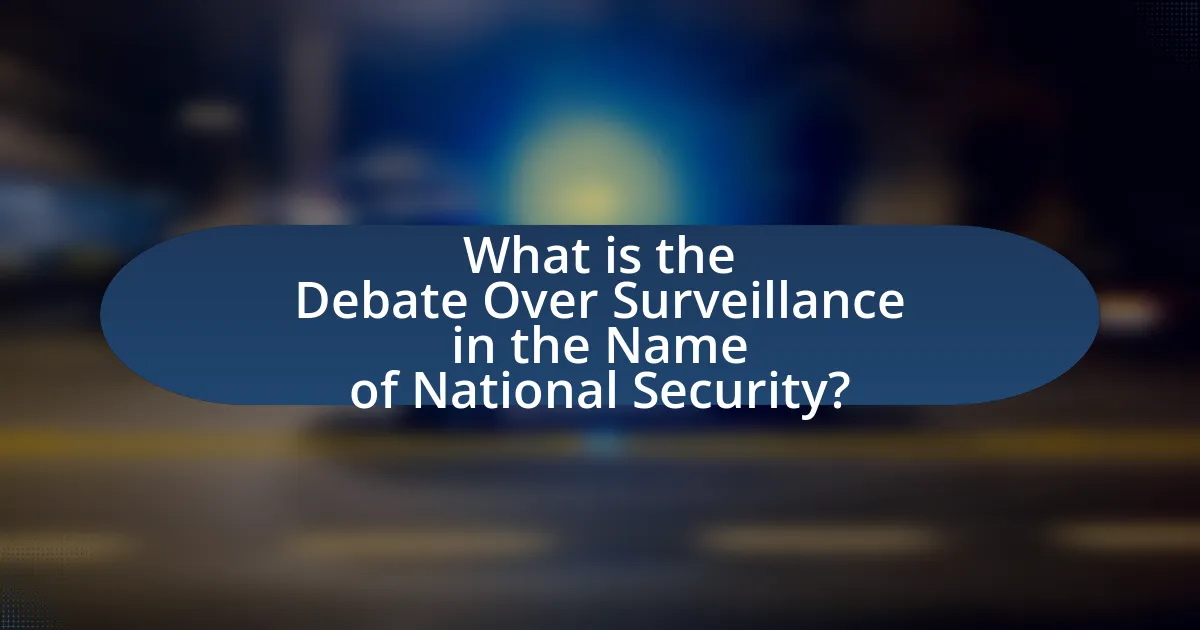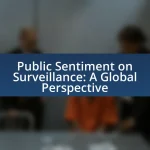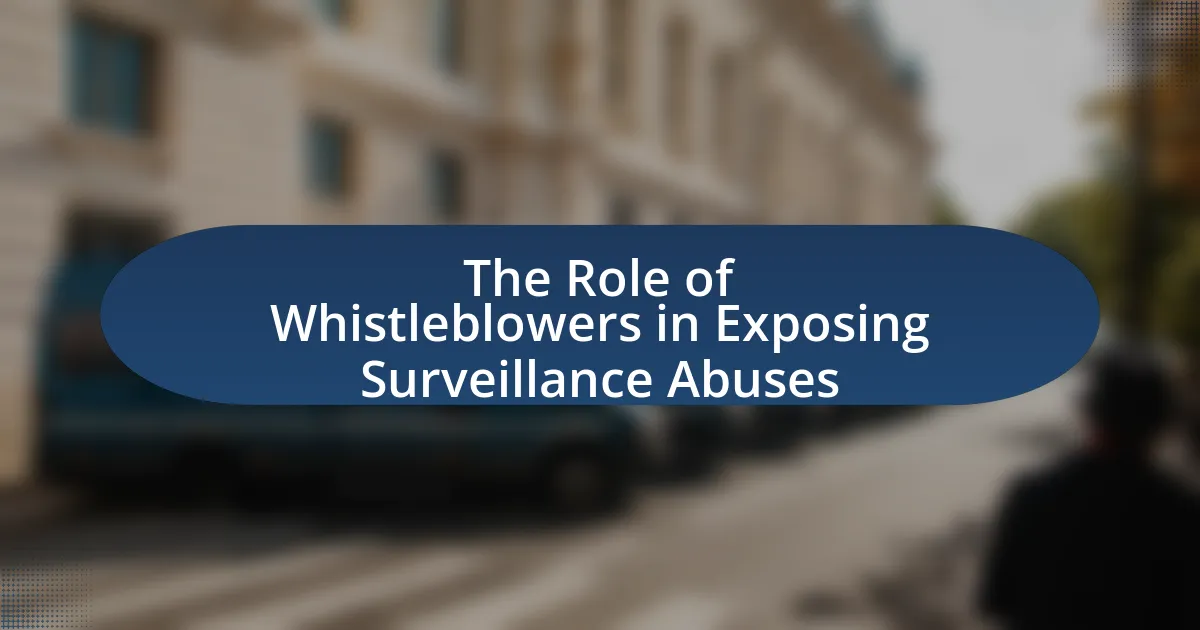The article examines the ongoing debate over surveillance practices implemented in the name of national security, focusing on the tension between protecting citizens and preserving individual privacy rights. It outlines arguments for and against surveillance, highlighting its perceived necessity for preventing terrorism and enhancing public safety, while also addressing concerns about civil liberties and government overreach. Key historical events, legal frameworks, and technological advancements are discussed, alongside the implications of surveillance on civil liberties, public opinion, and future policy-making. The article emphasizes the need for a balanced approach that safeguards both national security interests and individual privacy rights.

What is the Debate Over Surveillance in the Name of National Security?
The debate over surveillance in the name of national security centers on the balance between protecting citizens and preserving individual privacy rights. Proponents argue that surveillance is essential for preventing terrorism and ensuring public safety, citing instances like the 9/11 attacks, where intelligence failures were linked to a lack of information. Critics, however, contend that such surveillance infringes on civil liberties and can lead to government overreach, as seen in the revelations by Edward Snowden regarding the NSA’s mass data collection practices. This ongoing discourse raises fundamental questions about the extent to which governments should monitor citizens in the interest of security versus the need to uphold democratic freedoms.
Why is surveillance considered necessary for national security?
Surveillance is considered necessary for national security because it enables governments to monitor potential threats and prevent terrorist activities. By collecting data on individuals and groups, authorities can identify suspicious behavior and intervene before incidents occur. For instance, the 9/11 attacks prompted increased surveillance measures in the United States, leading to the implementation of the USA PATRIOT Act, which aimed to enhance the government’s ability to gather intelligence and protect citizens. This proactive approach is supported by various studies indicating that surveillance can deter criminal activities and enhance public safety.
What historical events have influenced the perception of surveillance?
The perception of surveillance has been significantly influenced by historical events such as the Cold War, the September 11 attacks, and the revelations by Edward Snowden. During the Cold War, heightened fears of espionage led to increased government surveillance, shaping public attitudes towards privacy and security. The September 11 attacks in 2001 prompted the U.S. government to implement the Patriot Act, which expanded surveillance capabilities under the guise of national security, further normalizing intrusive monitoring. Edward Snowden’s 2013 disclosures about the National Security Agency’s mass surveillance programs sparked global debates about privacy rights and government overreach, fundamentally altering public perception and trust in surveillance practices.
How do governments justify surveillance measures?
Governments justify surveillance measures primarily by citing national security concerns. They argue that such measures are essential for preventing terrorism, protecting citizens, and maintaining public safety. For instance, following the September 11 attacks in 2001, the U.S. government expanded surveillance programs under the USA PATRIOT Act, claiming that increased monitoring of communications was necessary to thwart potential threats. Additionally, governments often reference legal frameworks and oversight mechanisms that are purportedly in place to ensure that surveillance is conducted lawfully and with respect for civil liberties. These justifications are frequently supported by statistics indicating a correlation between surveillance and the successful disruption of criminal activities, thereby reinforcing the argument that surveillance is a necessary tool for safeguarding national interests.
What are the main arguments for and against surveillance?
The main arguments for surveillance include enhanced national security and crime prevention, as it allows authorities to monitor potential threats and gather intelligence on criminal activities. For instance, the 9/11 attacks prompted increased surveillance measures in the U.S. to prevent future terrorist incidents, demonstrating its perceived effectiveness in safeguarding citizens.
Conversely, the main arguments against surveillance focus on privacy violations and potential abuse of power. Critics argue that extensive surveillance can lead to unwarranted intrusion into personal lives, as evidenced by the backlash against the NSA’s mass data collection revealed by Edward Snowden in 2013. This incident highlighted concerns about government overreach and the erosion of civil liberties.
What are the benefits of surveillance in ensuring national security?
Surveillance significantly enhances national security by enabling the detection and prevention of potential threats. It allows government agencies to monitor activities that may indicate criminal or terrorist behavior, thereby facilitating timely interventions. For instance, the use of surveillance technology has been instrumental in thwarting numerous terrorist plots, as evidenced by the disruption of the 2006 transatlantic aircraft plot, where intelligence gathered through surveillance played a crucial role. Additionally, surveillance aids in gathering intelligence on organized crime, cyber threats, and other security challenges, thereby contributing to a safer environment for citizens.
What are the potential risks and downsides of surveillance practices?
Surveillance practices pose significant risks and downsides, including the erosion of privacy, potential misuse of data, and the chilling effect on free expression. The erosion of privacy occurs as individuals are constantly monitored, leading to a loss of personal autonomy and trust in institutions. Misuse of data can happen when sensitive information is accessed or exploited by unauthorized parties, resulting in identity theft or discrimination. The chilling effect on free expression is evidenced by studies indicating that individuals may self-censor their speech and actions when they believe they are being watched, which undermines democratic engagement and societal discourse. These risks highlight the complex ethical and social implications of surveillance in the context of national security.
How does public opinion shape the debate over surveillance?
Public opinion significantly influences the debate over surveillance by shaping policymakers’ decisions and public discourse. When citizens express concerns about privacy violations or support for national security measures, these sentiments can lead to legislative changes or the implementation of oversight mechanisms. For instance, following the Edward Snowden revelations in 2013, public backlash against mass surveillance prompted discussions in Congress about reforming the USA PATRIOT Act, illustrating how collective opinion can drive legislative scrutiny and accountability in surveillance practices.
What factors influence public perception of surveillance measures?
Public perception of surveillance measures is influenced by factors such as privacy concerns, perceived effectiveness, transparency of the measures, and societal trust in government institutions. Privacy concerns arise from the fear of personal data misuse, as highlighted by studies showing that 70% of individuals are worried about their online privacy. Perceived effectiveness relates to how well the public believes surveillance can prevent crime or terrorism, with research indicating that effective communication of success stories can enhance public support. Transparency plays a crucial role; when surveillance measures are openly discussed and justified, public acceptance tends to increase. Lastly, societal trust in government institutions significantly impacts perception; a 2021 survey found that countries with higher trust levels in government tend to support surveillance measures more than those with lower trust.
How do different demographics view the balance between security and privacy?
Different demographics view the balance between security and privacy in varied ways, influenced by factors such as age, political affiliation, and cultural background. For instance, younger individuals often prioritize privacy and express concern over government surveillance, as evidenced by a 2021 Pew Research Center study showing that 81% of adults aged 18-29 believe that the risks of government surveillance outweigh the benefits. In contrast, older demographics, particularly those over 65, tend to favor security measures, with 62% indicating that they are more concerned about crime than privacy issues. Additionally, political affiliation plays a significant role; conservatives are generally more supportive of surveillance for national security, while liberals advocate for stronger privacy protections. This divergence highlights how demographic factors shape perceptions of the trade-off between security and privacy in the context of national security debates.
What legal frameworks govern surveillance practices?
Legal frameworks governing surveillance practices include the Foreign Intelligence Surveillance Act (FISA) in the United States, which regulates government surveillance of foreign powers and agents, and the General Data Protection Regulation (GDPR) in the European Union, which sets strict guidelines on data privacy and protection. FISA, enacted in 1978, allows for the collection of foreign intelligence information while providing oversight through the Foreign Intelligence Surveillance Court. GDPR, effective since May 2018, mandates that personal data be processed lawfully, transparently, and for specific purposes, impacting how surveillance data is handled in the EU. These frameworks establish the legal boundaries and requirements for surveillance activities, ensuring a balance between national security interests and individual privacy rights.
What laws exist to regulate government surveillance in various countries?
Various countries have enacted specific laws to regulate government surveillance. In the United States, the Foreign Intelligence Surveillance Act (FISA) governs the collection of foreign intelligence information, while the USA PATRIOT Act expanded surveillance capabilities post-9/11. In the United Kingdom, the Investigatory Powers Act 2016 outlines the legal framework for surveillance, including bulk data collection. Germany’s Federal Data Protection Act regulates the processing of personal data, including surveillance activities. In Canada, the Investigative Powers for the 21st Century Act addresses surveillance and data retention. These laws aim to balance national security interests with individual privacy rights, reflecting each country’s approach to surveillance regulation.
How do international agreements impact national surveillance policies?
International agreements significantly shape national surveillance policies by establishing frameworks that govern data sharing, privacy standards, and security cooperation among countries. For instance, agreements like the General Data Protection Regulation (GDPR) in the European Union set stringent rules on data protection that influence how member states and other countries handle surveillance practices. These agreements compel nations to align their surveillance policies with international norms, often leading to increased transparency and accountability in data collection methods. Additionally, treaties such as the Mutual Legal Assistance Treaties (MLATs) facilitate cross-border cooperation in law enforcement, impacting how national agencies conduct surveillance operations. The interplay between international agreements and national policies is evident in the way countries adapt their legal frameworks to comply with global standards, ensuring that their surveillance practices do not violate international human rights obligations.
How do technological advancements affect the surveillance debate?
Technological advancements significantly intensify the surveillance debate by enhancing the capabilities of monitoring and data collection. For instance, the proliferation of artificial intelligence and machine learning allows for real-time analysis of vast amounts of data, which raises concerns about privacy and civil liberties. According to a 2020 report by the Electronic Frontier Foundation, the use of advanced surveillance technologies, such as facial recognition and predictive policing, has led to increased scrutiny over government practices and the potential for abuse. This evolution in technology not only expands the scope of surveillance but also complicates the ethical considerations surrounding national security measures, as citizens grapple with the balance between safety and privacy rights.
What role do emerging technologies play in enhancing surveillance capabilities?
Emerging technologies significantly enhance surveillance capabilities by providing advanced tools for data collection, analysis, and monitoring. Technologies such as artificial intelligence, facial recognition, and the Internet of Things enable real-time processing of vast amounts of data, allowing for more effective tracking and identification of individuals. For instance, AI algorithms can analyze video feeds from surveillance cameras to detect suspicious behavior, while facial recognition systems can match faces against databases to identify potential threats. According to a report by the Brookings Institution, the integration of these technologies has led to increased efficiency in law enforcement operations, demonstrating their critical role in modern surveillance practices.
How do privacy-enhancing technologies challenge traditional surveillance methods?
Privacy-enhancing technologies (PETs) challenge traditional surveillance methods by enabling individuals to control their personal data and limit unauthorized access. These technologies, such as encryption and anonymization tools, obstruct the ability of surveillance systems to collect and analyze data effectively. For instance, end-to-end encryption prevents third parties from intercepting communications, thereby undermining mass surveillance efforts. Additionally, PETs like Tor and VPNs obscure users’ online identities, making it difficult for traditional surveillance methods to track individuals’ activities. The rise of these technologies has prompted discussions about the balance between national security and individual privacy rights, highlighting the limitations of conventional surveillance approaches in an increasingly privacy-conscious society.
What are the ethical considerations surrounding surveillance for national security?
The ethical considerations surrounding surveillance for national security primarily involve the balance between individual privacy rights and collective security needs. Surveillance practices can infringe on personal freedoms, leading to potential abuses of power and discrimination against specific groups. For instance, the USA PATRIOT Act, enacted after the September 11 attacks, expanded surveillance capabilities but raised concerns about civil liberties violations, as highlighted by organizations like the American Civil Liberties Union (ACLU). Additionally, ethical dilemmas arise regarding informed consent, as individuals often remain unaware of surveillance activities, undermining their autonomy. The implications of mass data collection also pose risks of misuse and erosion of trust in government institutions, emphasizing the need for transparent policies and oversight mechanisms to safeguard ethical standards in national security surveillance.
How do ethical theories apply to the justification of surveillance practices?
Ethical theories provide frameworks for evaluating the justification of surveillance practices by weighing the balance between individual rights and collective security. Utilitarianism, for instance, supports surveillance if it maximizes overall happiness and safety, as seen in national security measures that aim to prevent terrorism. Conversely, deontological ethics emphasizes the importance of individual rights and privacy, arguing that surveillance infringes upon personal freedoms regardless of potential benefits. Additionally, virtue ethics encourages a focus on the character and intentions behind surveillance practices, questioning whether they align with societal values of trust and respect. These ethical perspectives highlight the complex moral landscape surrounding surveillance, where justifications can vary significantly based on the underlying ethical framework applied.
What are the implications of surveillance on civil liberties and human rights?
Surveillance significantly undermines civil liberties and human rights by eroding privacy, fostering a culture of fear, and enabling potential abuses of power. The constant monitoring of individuals can lead to self-censorship, as people may refrain from expressing dissenting opinions or engaging in lawful activities due to the fear of being watched. Historical evidence, such as the NSA’s mass surveillance programs revealed by Edward Snowden in 2013, illustrates how extensive data collection can infringe on the right to privacy and freedom of expression. Furthermore, surveillance disproportionately affects marginalized communities, leading to systemic discrimination and violations of rights. Studies, including those by the American Civil Liberties Union, have shown that increased surveillance often correlates with heightened racial profiling and civil rights abuses. Thus, the implications of surveillance extend beyond mere observation, posing serious threats to the foundational principles of democracy and individual freedoms.
What are the implications of the surveillance debate for future policy-making?
The implications of the surveillance debate for future policy-making include the necessity for balancing national security interests with individual privacy rights. As governments increasingly rely on surveillance technologies to enhance security, policy-makers must address public concerns regarding civil liberties and data protection. For instance, the USA PATRIOT Act, enacted after the September 11 attacks, expanded surveillance capabilities but also sparked significant backlash over privacy violations, leading to ongoing discussions about reform. This historical context illustrates that future policies will likely need to incorporate transparency measures and oversight mechanisms to maintain public trust while ensuring effective security measures.
How can policymakers balance national security and individual privacy rights?
Policymakers can balance national security and individual privacy rights by implementing robust legal frameworks that ensure oversight and accountability in surveillance practices. For instance, the USA PATRIOT Act introduced measures for national security but also faced criticism for infringing on privacy rights, leading to reforms like the USA FREEDOM Act, which aimed to limit bulk data collection. This demonstrates that effective legislation can protect both security interests and individual rights by establishing clear guidelines on data collection, usage, and retention, while also incorporating transparency measures and avenues for public accountability.
What best practices can be implemented to ensure responsible surveillance?
To ensure responsible surveillance, organizations should implement transparency, data minimization, and accountability measures. Transparency involves clearly communicating surveillance practices to the public, which fosters trust and allows for informed consent. Data minimization requires collecting only the information necessary for specific purposes, thereby reducing the risk of misuse. Accountability measures, such as regular audits and oversight by independent bodies, ensure compliance with legal standards and ethical guidelines. These practices are supported by studies indicating that transparency and accountability can significantly enhance public trust in surveillance systems, as evidenced by research from the Berkman Klein Center for Internet & Society at Harvard University, which highlights the importance of these principles in maintaining a balance between security and civil liberties.
What can individuals do to protect their privacy in a surveillance-heavy environment?
Individuals can protect their privacy in a surveillance-heavy environment by utilizing encryption tools for communication and data storage. Encryption secures personal information by converting it into a code that can only be accessed with a specific key, making it difficult for unauthorized parties to intercept or decipher the data. For instance, using end-to-end encrypted messaging apps like Signal or WhatsApp ensures that only the intended recipients can read the messages. Additionally, individuals should employ virtual private networks (VPNs) to mask their IP addresses and encrypt internet traffic, which helps prevent tracking by third parties. According to a 2021 report by the Electronic Frontier Foundation, using these tools significantly reduces the risk of surveillance and enhances online privacy.





